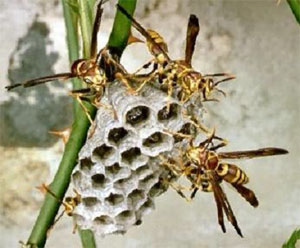The paper wasp gets its name from its paper-like nest. Sometimes they are also called umbrella wasps. This pest can produce a very painful sting to which some people are very allergic.
 How to Identify Polistes Paper Wasps
How to Identify Polistes Paper Wasps
Yellow jackets, honey bees, hornets, and wasps instill fear in many people. In the residential setting, the paper wasp is one of the most feared. This comes from its burning sting. The paper wasp is slightly longer than the yellow jacket – 5/8 to 3/4 inches long. Their nests are made of paper and are dusty brown to gray in color with up to 250 cells. The cells are pointed downward and are easily visible as the wasps work the nest. The nest is comprised of one open tier with its cells exposed, and secured about 1/2″ from an overhang or deck rail, etc. The paper top serves as a covering and it is umbrella shaped. In Raleigh, Charlotte, and Wilmington, the wasp nests are usually first seen in the spring with one queen that starts building the nest.
The Biology and Habits of Paper Wasps
Paper wasps are semi-social insects that live in small to moderately-sized colonies. In the spring, overwintering fertilized queens start to build nests.
The initial queen can be joined by other fertilized queens and the founding queen’s purpose is to lay eggs. The other secondary queens take over the duties of maintenance for the nest. The nest is never enclosed and the comb is easily seen beneath the nest.
A single egg is laid in the cell and is capped when the larva is ready to pupate. Most nests are not reused another year. If this nest is disturbed by vibrations on a deck, such as children playing on a play set etc., the wasps attack and sting to defend what is perceived as a threat.
In the fall, fertilized females will seek a spot to overwinter. These overwintering spots can consist of cracks and crevices that provide entrance to attic and wall areas in a structure.
Once in the attic areas, if there is an unseasonably warm day in the winter or spring, the overwintering queens may wander into living spaces. These wasps, while a nuisance, are also beneficial because they are predators on other insects, especially garden caterpillars.
Where do You See Paper Wasps?
You will first start to notice paper wasps when spring comes. The first sightings will be overhangs and porch areas. They can also be noticed flying around the home looking for a good location to start building their nest.
Do-it-yourself ways to reduce the possibility of wasps in the home: You want to make sure that all eaves are caulked to prevent overwintering wasps from entering the attic areas. Also, check all bathroom vents to confirm that they are working properly and to prevent penetration into the pipe leading to the bathroom. And make sure all areas of the roof line are sealed to prevent entrance into the attic and eaves.
- Repair or install tight-fitting screens on windows, doors, gables, foundation and soffit vents
- Install weather stripping and door sweeps
- Seal gaps around doors and windows
- Seal all siding with good exterior caulk
- Repair any dryer and bathroom vents
- Repair foundation cracks
- Seal around HVAC systems
- Seek professional assistance and a pest prevention plan
Ways to reduce wasp stings:
- Be very aware of streams of wasps coming and going
- Do not try to agitate or play with them
- Use a professional to eliminate the nest or colony
Economy Exterminators’ Pest Control Solutions program uses the 4-step approach to solve your wasp pest problem:
- Our 1st step is the inspection of the property by a Raleigh, Charlotte or Wilmington customer service representative.
- The 2nd step would be the initial treatment by a customer service representative. Critical areas are usually ground decks, eaves, handrails, attics (for overwintering wasps) and dryer and bath vents. Our Pest Control Solutions program treatment includes the treatment of these wasps.
- The 3rd step is a 37-point inspection of your property to identify areas on your property that give the wasps easy access to your property.
- The 4th step is our ongoing maintenance program.

 How to Identify Polistes Paper Wasps
How to Identify Polistes Paper Wasps


